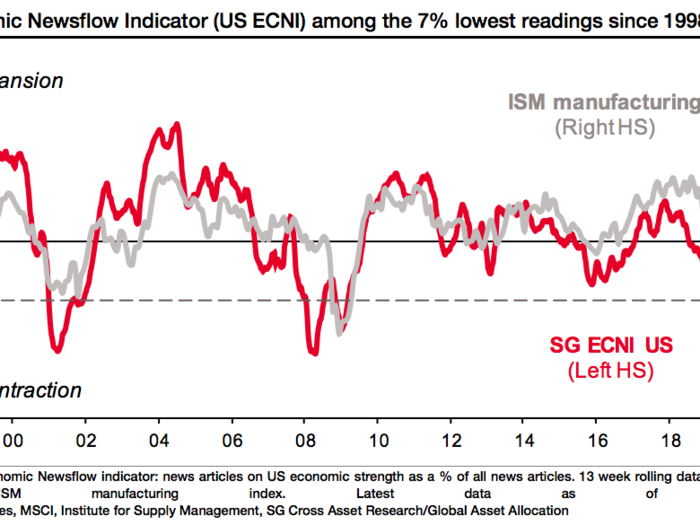- Home
- slideshows
- miscellaneous
- Spending's slumping, manufacturing's slowing, and delinquencies are rising. Warning signs for the US economy are piling up.
Spending's slumping, manufacturing's slowing, and delinquencies are rising. Warning signs for the US economy are piling up.
American manufacturing is in danger of entering a recession this year

Retail sales collapsed by the most since 2009 in December

Retail sales plummeted by the most in nine years in December.
The Commerce Department said Thursday that retail sales sank 1.2% to $505.8 billion, marking the biggest drop since 2009, as receipts fell in nearly every major category. The results were well below economist expectations for a 0.1% increase.
"In one line: Unbelievable," Shepherdson at Pantheon Macroeconomics said. "These numbers are astonishing, and impossible to square with the Redbook chain-store sales survey, which reported surging sales in December and a record high in the week of Christmas, on the back of the plunge in gasoline prices."
Excluding volatile categories including gasoline, cars and food, core retail sales dropped 1.7% in December. In November, they had risen 1%.
"The decline in gasoline spending was not a surprise, but the rest of the weakness in retail sales was worse than expected," said Adam Ozimek, an economist at Moody’s. "We are likely seeing some combination of wealth effects from falling stock prices and a the effects of a bad winter."
American household debt just hit a new record high

Americans faced record levels of debt at the end of 2018, with the amount owed by households rising for an eighteenth consecutive quarter.
Overall debt rose by $32 billion to $13.5 trillion in the fourth quarter, the Federal Reserve Bank of New York said in a report out Tuesday, bringing it to a fresh high.
Total household debt was nearly 7% higher than a previous peak of $12.68 trillion seen in the third quarter of 2008, underscoring potentially vulnerable spots in an otherwise humming economy.
"We are not in the 'red' zone of danger yet, but these measures are trending in the wrong direction, so it’s something to keep an eye on," said Josh Wright, chief economist at iCIMS. "There’s a risk there to the U.S. consumer engine."
A record 7 million Americans have stopped paying their car loans

A record number of Americans were three months or more late on making car payments. At the end of 2018, auto loans facing serious delinquency rose 2.4% to more than 7 million.
“The overall performance of auto loans has been slowly worsening, despite an increasing share of prime loans in the stock,” New York Fed economists wrote in a subsequent report. “The substantial and growing number of distressed borrowers suggests that not all Americans have benefitted from the strong labor market and warrants continued monitoring and analysis of this sector.”
The data show that most of the borrowers whose auto loans have recently moved into delinquency are people younger than 30 years old and people with low credit scores. Eight percent of borrowers with credit scores below 620 — otherwise known as subprime — went from good standing to delinquent on their auto loans in the fourth quarter of 2018.
-- With additional reporting from Tanza Loudenback
And the newsflow around the economy is deteriorating

Strategists at Societe Generale suspect the next recession will arrive sooner than everyone thinks. And that's in part based on their proprietary newsflow indicator, which is based on a count of news articles discussing economic strength as a percentage of all stories. It weakens as bearish media coverage increases, and is used as a leading indicator of growth.
SocGen's newsflow indicator appears to be front-running a contraction in manufacturing output, as measured by the Institute for Supply Management's Purchasing Managers' Index, as the chart above shows. (Click here for more on this topic.)
"In our view, profit warnings, defaults and increased volatility are likely to be the dominant themes in the next 12 months," a team of strategists including Arthur van Slooten said in a note to clients.
-- With additional reporting from Akin Oyedele
Popular Right Now
Popular Keywords
Advertisement
